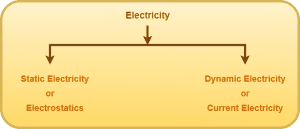Electricity-
| The branch of physics which deals with the study of electric charges is called as Electricity. |
There are two branches of electricity-

1. Static Electricity-
The branch of physics which deals with the study of electric charges at rest is called as static electricity also called as electrostatics.
2. Current Electricity-
The branch of physics which deals with the study of electric charges in motion is called as current electricity.
Electric Current-
|
Qualitatively,
The flow of electric charges through a conductor constitutes an electric current. |
|
Quantitatively, Electric current in a conductor across an area held perpendicular to the direction of flow of charge is defined as the amount of charge flowing across that area per unit time. |
Average Current-
If a charge ΔQ passes through an area in time interval Δt, then current I flowing through the conductor is given by-

Instantaneous Current-
The current flowing through the conductor at any particular instant of time is called as instantaneous current.
If the time interval Δt becomes very small i.e. Δt → 0, then instantaneous current is defined as-

OR

Steady Current-
If the rate of flow of charges does not change with time, then current flowing through the conductor is said to be steady current.

Here, Q is the charge that flows across the given area in time t.
If n electrons pass through the area in time t, then-

Characteristics of Electric Current-
Characteristic-01:
|
The SI unit of electric current is ampere (A).
1 A = 1 Cs-1 |
If one coulomb of charge crosses an area in one second, then the current flowing through that area is one ampere.
Characteristic-02:
|
The direction of flow of positive charges is taken as the direction of electric current. OR The direction of electric current is opposite to the direction of flow of negative charges (electrons). |
Characteristic-03:
| Electric current is a scalar quantity. |
- Although electric current possess both magnitude and direction, even then it is a scalar quantity.
- This is because the laws of vector addition are not applicable to the addition of electric currents.
Examples-

MCQs Quiz-
Worksheet-
Next Article-
Get More Notes & Other Study Material Of The Chapter Current Electricity.

